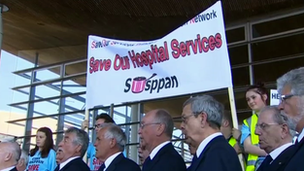Q&A: Row over NHS review report in Wales
- Published

Can the public be accepted to accept changes to hospitals?
A furious row has broken out in the Welsh assembly about an academic's report into the future of the NHS.
Accusations have flown around the Senedd chamber. Opposition parties say the findings of health economist Marcus Longley can no longer stand as independent research, while ministers say opposition AMs have besmirched his reputation.
Meanwhile, potentially big changes are being planned for the NHS.
There is already anxiety in some communities about what's been called hospital downgrading, although ministers insist that no hospital will be downgraded or closed.
Why are tempers running so high?
More than half a century after one of their predecessors created it, few things arouse the passions of Welsh politicians as much as the NHS. But the service that Aneurin Bevan founded is regarded as being in need of change.
Ministers say the service must adapt to the way we live and to developments in modern medicine. A pattern of hospital services that was right for an earlier generation is not going to be appropriate for today.
How did Professor Marcus Longley become involved?
The challenge for proponents of change in the health service is to build a case in favour of those changes. The public has shown itself to be sceptical about tinkering with services that are familiar to them. A previous attempt to reorganise hospital services in 2007 blew up in the face of the then Labour Welsh government. It paid the price at the ballot box.
So the current government is determined not to repeat that mistake. Local health boards have been working out how to put services on a long-term footing. The first sets of proposals are expected next month from the Hywel Dda and Betsi Cadwaladr health boards. In October, the Cwm Taf, Cardiff and Vale and Abertawe Bro Morgannwg boards - who have been working together on plans for south Wales - will publish their proposals.
But before they can win us over, the health boards want to convince the public that change is necessary. This is where Professor Marcus Longley, a health economist, comes in. He was commissioned by the organisation representing health boards and trusts - the NHS Confederation - to examine the evidence and write a report to explain the case for reforming hospital services.
What did he have to say about the NHS?
Prof Longley, who is based at the University of Glamorgan, is not the first to raise concerns about the way the NHS is set up. In a report in 2003 Derek Wanless told the assembly that the service was not sustainable and that demand could overwhelm the workforce and system. Last year the Bevan Commission said expectations of and demand on the NHS were increasing. It prescribed "bold and courageous action, in partnership with the people of Wales".
So Prof Longley is part of a well-established tradition of report authors who have seen a need for reform. But his warning is perhaps the most stark yet. <link> <caption>Published in May, his report</caption> <url href="http://www.welshconfed.org/WIHSCreport.htm" platform="highweb"/> </link> pulled no punches on the scale of the challenge:
Some services will "collapse" because of shortages of key staff, it said.
Some specialisms were under "acute pressure".
A growing body of evidence suggested patients were not always getting the best treatment possible.
In some cases - including major trauma, emergency care, and maternity - the way services are organised "probably falls well short of what the evidence suggests is optimal".
So do the politicians disagree with the expert?
It's not so much Prof Longley's verdict that some politicians don't like - it's the way he arrived at his conclusions and the way the Welsh government presented them. The political row that now surrounds his report is essentially about the validity of his evidence. Opponents say the involvement of civil servants who provided him with data to back up his case undermines the assertion that his was an independent conclusion.
The report itself acknowledges that evidence can be "frustratingly vague". Nevertheless, the evidence available has been held up as proof that patients might suffer because of sub-optimal services. NHS medical directors stand by Prof Longley's findings, saying they show the need for urgent reform. But the British Medical Association is not convinced, and claims "there is no way that this report can continue to be hailed as an independent piece of academic research".
What happens next?
Health Minister Lesley Griffiths faces a no-confidence motion in the assembly. Labour does not have a majority of seats, but the motion is non-binding. It is politically significant that opposition leaders have put their differences aside to round on the government. But even if their motion is approved, Mrs Griffiths will not have to quit. There is also talk about her giving evidence to the cross-party health committee.
Meanwhile, local health boards will go out to public consultation. There have been demonstrations on the steps of the Senedd already, even before proposals are published. Prof Longley's report was going to be a key plank in persuading those protesters and the public at large to accept change. The pressure to reform services is not going to go away. But with the whole process mired in a nasty political row, neither will scepticism about those changes.
- Published11 July 2012
- Published10 July 2012
- Published10 July 2012
- Published10 July 2012
- Published10 July 2012
- Published9 May 2012
- Published1 May 2012
- Published26 March 2012